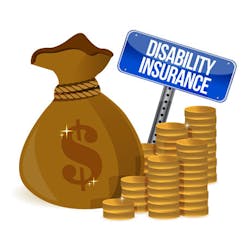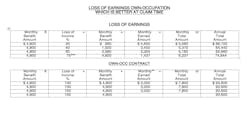What dentists should know about disability insurance: Part 3
What kind of business protection policies are available for dentists in the event of disability?
This series of articles explains the various sources of disability income, what disability insurance is, and what it covers. The articles will also explain how to evaluate personal sources of disability income, and briefly discuss how to compare disability policies. With this information you will be able to make an informed decision about whether you have a need for individual disability insurance and, if so, which features are most important to you. Read Part 1 and Part 2.
What can happen if you’re underinsured?
Many people who thoughtfully protect their families against the loss of income from their (the breadwinner’s) death fail to think about what will happen if they’re unable to earn a living due to disability. In fact, long-term disability may worsen a family’s financial situation more than a wage earner’s death, because income stops but expenses continue.
The story of Bob Jackson, DDS, illustrates what can happen when people don’t have enough insurance. Bob and Ann are the parents of a six-year-old girl. They live in a small city in Nebraska where Bob, 31, currently earns $65,000 as a dentist in a small practice. After staying home for several years to care for their daughter, Ann now works as a part-time as a nurse earning $45,000 yearly.
Life was uneventful for the Jacksons until Bob became ill and was determined by his doctor to be totally disabled. Suddenly there was a dramatic reduction in the Jackson’s income. At the moment and because of debt reduction expenses, they live in a rental apartment because they had no mortgage disability insurance to cover basic housing costs in the event of disability.
Bob isn’t eligible for Social Security disability because he had not been working long enough in covered employment. Even if he had worked long enough, social security’s strict definition of disability would have rejected him. He has no prior military or civil service that would qualify him for other government disability programs. He doesn’t qualify for workers’ compensation benefits because his illness isn’t job related.
Bob is fortunate, though, because he is entitled to group long-term disability benefits. Under his employer’s policy, he will receive 60% of his gross salary, or $3,250 a month before taxes. (Because his employer paid the premium, the benefits are taxable.) He also must now personally pay a monthly health insurance premium of $1,200, which his employer paid before, in order to continue his family’s group medical policy.
With Ann’s earnings the Jacksons must now live on a monthly income considerably less than their former semi-comfortable lifestyle. Moreover, because the group policy does not include a cost-of-living adjustment, the buying power of Dr. Jackson’s benefits will diminish each year. They would have been far better protected with a supplemental individual disability insurance policy (which also pays benefits on a tax free basis). This includes a cost-of-living adjustment or dropping the group LTD coverage and getting an individual policy that doesn’t have any of the group’s wording and contractual deficiencies (22 in all. Visit my website for a detailed list or read Part 1 or PArt 2 of this series).
What to look for in the ideal individual disability insurance policy
A special note to self-employed dentists:Purchasing disability insurance can be particularly important when you’re your own employer. Not only will you not receive benefits from a group plan, your entire business may suffer if you’re to ill to remain in charge. Whether you’re an employee or employer, Disability Insurance Resource Center can help you analyze your sources of disability income. (Search for the article, "How to Select The Ideal Disability Policy.") It can help you determine periods for various benefits, determine whether additional coverage is wise, and help you select the ideal policy for your needs and eligibility.
What else do dentists need to know?
Selecting the amount and duration of benefits is only the first step. Because you also want to be sure that coverage will continue, you should ask about renewability. Disability Insurance Renewability comes three ways.
1. Non-cancelable policies give you the right to continue in force a policy by the timely payment of premiums, and the insurance company cannot change the premiums and benefits shown in the policy.
2. Guaranteed renewable policies will be automatically renewed with the same benefits, but the premium may be increased if it is changed for an entire class of policyholders.
3. Optionally renewable or conditionally renewable policies can be extended at each anniversary or premium due date if the insurance company decides to do so.
Most policies include a waiver of premium provision so that you don’t have to pay premiums after you’re disabled for at least 90 days. Some policies offer the opportunity to buy additional disability coverage to keep pace with a rising income, without having to pass a medical exam or submit more evidence of insurability.
In general, if you pay the premiums for an individual disability policy, payments you receive under the policy are not subject to income tax. If your employer has paid some or all of the premiums, some or all of the benefits may be taxable.
When you buy (actually, “apply”), consider a policy that pays disability benefits for both accident and illness. Some policies pay only for accidents, but it is advisable to be insured for illness too. In fact, as you get older it’s more likely that you’ll need to be covered for illness than for injury.
Stay tuned for the fourth and final article in the series, "Frequently Asked Questions about Disability Insurance," later this month.
READ PART 1 of What dentists should know about disability insurance
READ PART 2 of What dentists should know about disability insurance



